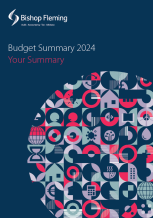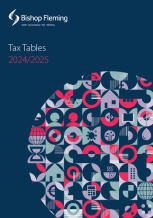Spring Budget 2024 at a glance
Chancellor's Spring Budget 6 March 2024
Jeremy Hunt's second Spring Budget is framed by the forthcoming election and the need to be seen as a tax cutter in the mould of Nigel Lawson. But the economic background to this Budget is very different from 1988's tax cutting event as there is no huge surplus to play with this time.
So, to achieve some headline tax cuts, or more accurately NIC cuts, he has to be more like Robin Hood and take money from elsewhere in order to deliver the goods.
Hence the scaling back of the non-dom rules, and abolishing the furnished holiday lettings regime from April 2025.
This allows him to cut taxes now and possibly cut taxes again in the autumn before an election. But it ignores council tax increases as well as the elephant in the room of fiscal drag from frozen tax allowances, creating a record-high tax burden since 1945. Increasing personal allowances would have had more of an impact on people's earnings.
As well as cuts to NICs, benefits will rise with September's inflation figures and state pensions in line with earnings. The national living wage will rise by almost 10%. But with frozen allowances, more people are dragged into tax, including pensioners,
The VAT threshold is rising by £5,000 to £90,000, the first increase in seven years. Had it risen with inflation it would now be roughly £110,000 (but that would have contravened the EU's €100,000 VAT threshold for setting VAT rules in Northern Ireland under the Northern Ireland protocol and the Windsor framework).
This small VAT threshold increase does nothing to address the real issue for small businesses worried that falling over the VAT registration cliff edge will make them less competitive.
There is a surprise 4% cut in the higher rate of CGT on residential property disposals (presumably to help those selling their second homes?). This adds to the complexity of CGT in that we now have five rates of the tax: 10%, 18%, 20%, 24%, 28%.
Reform of the Higher Income Child Benefit Charge is very welcome for many families unfairly caught by the charge.
See Spring Budget 2024 Treasury page and Overview of tax rates
Brief recap – key changes previously announced:
- Personal tax thresholds, CGT IHT etc. limits all frozen until 2028
- Tax free allowance for capital gains reduced from £6,000 to £3,000 in 2024.
- Stamp Duty Land Tax cuts announced in Truss's Budget to end on 31 March 2025.
- The tax-free dividend allowance to be reduced to £500 in 2024.
- Full Capital Expensing in place permanently from April 2024, so every £1 a company invests in IT equipment, plant or machinery can be deducted in full from taxable profits..
- Single R&D scheme from April 2024,
- Class 2 NIC abolished and Class 4 cut by 1% both from April 2024
- Increase in the National Living Wage to £11.44 per hour
Spring Budget 2024 key measures announced:
Taxes
- Alcohol duty freeze to February 2025
- Extending fuel duty freeze to 2024/25 and maintain existing 5p cut.
- Full Expensing to apply to leased assets when affordable
- Extending the Recovery Loan Scheme and renaming it as the Growth Guarantee Scheme
- VAT threshold increased from £85,000 to £90,000 from 1 April 2024
- New British ISA for tax-free investments in UK equity, on top of existing ISAs
- Increase by 5% the relief for creative tax credits
- New tax credit for UK films
- More than £1bn in additional tax relief for creative industries over the next five years - to boost inward investment and attract production companies from around the world.
- Excise duty on vaping from October 2026
- One off increase in tobacco duty
- Raising air passenger duty for business travellers
- Scrapping tax breaks on holiday lets - FHLs abolished from April 2025
- CGT higher residential property rate reduced from 28% to 24% from 6 April 2024
- Extending windfall tax on profits of oil and gas companies until 2029
- Scaling back the non-dom tax regime - new modern scheme from April 2025, so foreigners living in the UK for more than 4 years (currently 15 years) will pay tax on their foreign income and gains. There will be transitional relief.
- Plans to end unfairness in the Child Benefit system by April 2026, by assessing the High Income Child Benefit Charge based on household income rather than individual earnings. (This goes against Independent Taxation of Husband & Wife)
- From April 2024 the HICBC threshold will be raised to £60,000 and the top taper will increase from £60,000 to £80,000
- From April 2024, 2p cut on employee NICs (on top of the Jan 2024 cut)
- For the self-employed, the government will introduce legislation to reduce the main rate of Class 4 NICs by 2% from 8% to 6% from 6 April 2024. This is in addition to the previously announced reduction in the main rate of Class 4 NICs from 9% to 8%, and means that from 6 April 2024 the main rate will reduce from 9% to 6%.
- Abolishing Stamp Duty Multiple Dwellings Relief for transactions with an effective date on or after 1 June 2024
Spending
- More aid for people facing debt through targeted help.
- Extending the Household Support Fund with an extra £500m
- From April the first Investment Zones in the North of England & the Midlands will be launched, with a 10 year package of funding benefitting local skills, R&D, local infrastructure & business investment.
- Childcare from April 2024 - 30 hours per week confirmed
- Planned growth in public sector spending kept, but with focus on productivity to save £1.8bn
- Improving NHS productivity through digital integration and less red tape
- Pensions triple lock rises with earnings (8.5%) from April 2024
- Working age benefits will rise by the rate of inflation at 6.7% from April 2024.
- Business rate relief - small business multiplier frozen for a further year, and 75% relief for hospitality sector frozen for another year.
Tax Tables 2024/25
Links to HM Treasury pages
- HM Treasury Spring Budget 2024 and tax overview
- HM Treasury Autumn Statement 2023
- HMRC tax-related information
The Scottish and Welsh Budgets were both published on 19 December 2023.
Finance Bill 2023
Spring Finance Bill 2024 has been published, with more tax developments to follow on 18 April 2024 (Tax administration and maintenance day).
Finance Act 2024, based on the 2023 Autumn Statement, received Royal Assent on 22 February 2024.
Economic background to the Budget
Further information
If you would like to discuss how these changes in tax policy may affect you and/or your business, please contact your usual Bishop Fleming advisor.
[Gary Mackley-Smith]










